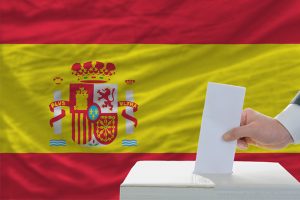 Spanish politics has featured highly in media headlines over the last few years from the breakthrough of parties such as Podemos and Ciudadanos (Citizens), the failed unilateral declaration of independence by the Catalan government in 2017, to the cascade of corruption accusations and charges that ultimately precipitated the collapse of the conservative PP government in June 2018. The latest general election, however, did not register any signs of voter fatigue. Turnout was over 75%, well above the average recorded in general elections since the Spanish transition to democracy.
Spanish politics has featured highly in media headlines over the last few years from the breakthrough of parties such as Podemos and Ciudadanos (Citizens), the failed unilateral declaration of independence by the Catalan government in 2017, to the cascade of corruption accusations and charges that ultimately precipitated the collapse of the conservative PP government in June 2018. The latest general election, however, did not register any signs of voter fatigue. Turnout was over 75%, well above the average recorded in general elections since the Spanish transition to democracy.
The Spanish Socialists (PSOE) under the leadership of Pedro Sánchez triumphed in this hotly contested multi-party election, securing 123 seats (38 more than in 2016), albeit a significant number short of a majority. In second place, the ironically-named Popular Party (PP) won just 66 seats, a total loss of 69 seats. The haemorrhaging of support for the Spanish conservatives underlined the role played by the numerous corruption scandals that have engulfed the party in recent years, but also demonstrated the growing popularity of Albert Rivera’s Citizens Party which has seriously challenged the PP on the centre-right of the ideological axis. Established in Catalonia as an anti-nationalist party which quickly transformed into a state-wide pro-Spain and explicitly Spanish nationalist party, Ciudadanos won a total of 57 seats, picking up an extra 25 than in 2016.
The major talking point of the election, however, was the election of 24 parliamentarians representing VOX. Established in 2013, VOX is a far-right ultranationalist party whose anti-Islamic, anti-immigrant and pro-Spanish unity rhetoric resonated with disillusioned PP supporters. The electoral breakthrough of this far-right movement is a new trend for Spanish politics, but the rapid rise of VOX is in line with the identifiable trend of the spread of right-wing populism across Europe, including the Lega Nord and Five Star Movement in Italy and Le Pen’s National Rally/National Front in France.
In Catalonia, the pro-independence ERC was the clearest victor of the election, winning 15 seats (6 more than in 2016). The party’s leader, Oriol Junqueras remains in custody and on trial for his role in the organisation of the 2017 referendum on Catalan independence, but this seems to have emboldened rather than enfeebled pro-independence Catalans, many of whom switched to the more left-leaning ERC for the first time. Yet, while pro-independence parliamentarians may represent a majority of Catalan seats in the Congress, the future direction of the independence movement is not yet clear. The heterogeneity of the independence movement – once considered an asset of this all-encompassing grouping – has proven to be a significant challenge. What is more, the electoral success of the PSOE as well as its natural allies Podemos, renders the support of pro-independence parliamentarians in the Congress less important. This potential loss of leverage will have prominent repercussions for the independence movement as a whole, though predictions of its demise are impercipient and premature.
The fragmentation of the right as well as infighting within Podemos delivered a clear electoral victory for the Spanish socialists. The electoral breakthrough of VOX is symptomatic of the wave of right-wing populism pervading Europe and underlines the growing disillusionment in Spain with the Spanish establishment. This increasing popularity in ‘making Spain great again’ (one of VOX’s electoral campaign slogans), combined with the ongoing push by pro-independence parliamentarians in Catalonia for a legally-sanctioned referendum on independence, illustrates the polarised political environment Spain’s new government will have to contend with. Buoyed by the electoral results, Mr Sánchez and his team have proclaimed that they are up for the challenge. The stakes, however, have never been higher.
Paul Anderson is a Lecturer in Politics and International Relations at Canterbury Christ Church.
 Politics
Politics LVM
LVM 1142
1142


It’s not just ” pro-independence parliamentarians” though who are pushing for a legal referendum in Catalonia, it’s apparently 70+ % of the Catalan population.
How long can Sánchez and state actors continue ignoring this post-failed statute demand? Repression, the only proposal from Spanish governments so far, is a double-edged sword.
Can exiled Puigdemont make a difference?